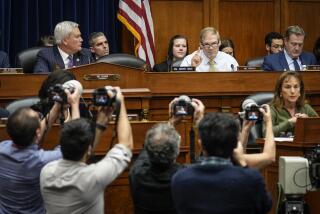Bush Facing First Trouble in House : Democrats Set Vote on Foreign Investor Bill He Opposes
- Share via
WASHINGTON — The House Democratic leadership is loading up for its first major political salvo at President Bush--scheduling a certain-to-be-partisan vote next week on a controversial provision to require the registration of most foreign investment in the United States.
The move was ordered by House Speaker Jim Wright (D-Tex.) despite assurances by Wright and other House leaders that Democrats will cooperate with Bush in hammering out bipartisan solutions to such problems as reducing the federal budget deficit.
News of the move took the Bush Administration by surprise, angering White House officials, who had expected the Democrats to hold back on overtly partisan gestures until the negotiations over the federal budget were well under way.
Democratic strategists said that the Speaker hopes to use the vote to “draw a battle line” early on between the Democrats and the Administration. They said that Wright wants to portray the Democrats as populists who care about such issues as foreign investment, while Republicans ostensibly do not.
Next week’s ballot, after the House returns from its Presidents’ Day recess, will be Congress’ first formal vote of the year--apart from last week’s rejection of the congressional pay raise legislation, which had not been on the original agenda.
Reagan Also Opposed Measure
Strategists say that the Administration is in a quandary. Like former President Ronald Reagan before him, Bush opposes the provision vehemently, but officials say that he does not want to take a high-profile stand on it for fear of playing into congressional Democrats’ hands.
The Administration has not yet decided how to meet the Democratic threat. Republicans on the House Foreign Affairs Committee are considering proposing a less-sweeping substitute that they hope will defuse the issue.
The proposal Wright wants to resurrect--known as the Bryant amendment, after its key sponsor, Rep. John Bryant (D-Tex.)--was a major point of friction between Democrats and Republicans in last year’s debate over the broad package of legislation that overhauled the nation’s trade laws.
The measure would require the registration--and public disclosure--of all foreign investments that exceed 10% ownership of an American company, piece of real estate or other asset. Although the legislation failed in the Senate, it has been passed twice by the House.
The Reagan Administration vigorously opposed the provision when Wright tried to tack it on to the trade bill last year, contending that it would only discourage foreign investment, which the United States needs to help finance American borrowing.
Democratic leaders argue that registration is needed to help keep track of the growth of foreign investment. They fear that the nation’s security will be endangered if too much of the U.S. economy is under foreign control.
The threat of possible enactment sent tremors through the financial markets last year. Many investors regard registration requirements as a prelude to stricter controls. Reagan listed the Bryant proposal as one of four provisions that would have made him veto the trade bill.
Congressional staff members say that the revival of the measure next week was ordered personally by Wright. The House Rules Committee has called a meeting for next Tuesday to release the legislation from a House committee and send it immediately to the floor.
House sources say that Wright plans to bring the Bryant legislation before the full House the next day. It is expected to be passed by a large--and overwhelmingly Democratic--majority. Most Republicans oppose the measure.
Republicans on the House Foreign Affairs Committee are considering proposing a more limited measure that would expand current statistics on investment trends without requiring registration.
Another alternative, being drafted by Rep. Edward F. Feighan (D-Ohio), would require registration of foreign investment, possibly with the congressional General Accounting Office, but would not force investors to make their transactions public.
Most trade analysts agree that the issue is mainly a political one. Although foreign investment has increased in recent years, much of it is needed to finance government and corporate borrowing in the United States without pushing domestic interest rates up.
The GAO reported recently that, although foreign investors spent a record $15.5 billion in hostile takeovers of American companies during the first six months of 1988, the figure included only six actual transactions--and accounted for 75% of all foreign acquisitions.
Most of the foreign investment in U.S. factories and real estate is by investors in Britain and the Netherlands, according to the GAO and Treasury Department. Japan has also been increasing its investment in the United States.
American corporations have invested heavily overseas since the end of World War II.
More to Read
Get the L.A. Times Politics newsletter
Deeply reported insights into legislation, politics and policy from Sacramento, Washington and beyond. In your inbox twice per week.
You may occasionally receive promotional content from the Los Angeles Times.









